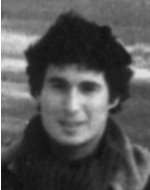Son of Leah and Moshe. He was born on 24 March 1968 in Tel Aviv. The eldest son of a family of three sons. Eliezer studied at the Bar-Ilan elementary school and when he reached the ninth grade, he moved to study and to be educated in the Nachalim Yeshiva. During this period he was a member of the Bnei Akiva youth movement. From an early age, Eli was mostly absorbed in reading, and even liked to write stories and illustrate cartoon stories. Eli aspired to continue his studies in the Torah, joined the Safra and Saifah, and chose to enlist in the hesder yeshiva and began his studies at the Kotel Yeshiva in Jerusalem, where he was educated on ideas of Torah and work and love for the Land. He believed in a combination of the sacred and the profane and the mixture between the various cultures.In late June 1986, Eliezer was drafted into compulsory military service in the Israel Defense Forces . He volunteered for the infantry, the paratroopers. His father, who also served as a paratrooper, encouraged and strengthened him towards the difficult route. Eliezer completed a long and difficult basic training, took a parachuting course and went with his unit to operational activities on the Lebanese border. His commander from this period wrote that Eliezer came to the company in a sense of mission, with high motivation. He was trustworthy, honest and dedicated and wanted to go on activities. During this period, it became very popular for me to express myself in writing. A close correspondence was established between me and the father of his friend Elazar. Eli often writes to his friend’s father about his feelings, his thoughts, and what happens to him in the army. In one of his many writings Eli wrote: “I feel and know that the people and the land are worth every drop of my sweat in training.” When he was away from home, his longing for his family increased and he often wrote to his friend Ora. In one of his letters, he wrote: “Today, on a tour, we met with a little bird-song, red-chested, and a bird of prey, whom I could not identify … They were thinking … The red-chest was so unaffected by the barbed wire … To meet in a green meadow or in a peaceful grove … “In another letter he wrote:” On the wall of the room there are inscriptions: “Doshim, cries of despair, etc. I decided to add something, I took a marker and wrote in huge letters: ‘The whole world is a very narrow bridge , And the main thing is not to be afraid at all. “Eli’s commander noted that he was free to discuss any issue and when there were disagreements with secular soldiers, he always made sure to reach an understanding and mediate between religious and secular soldiers And in the course of their military service and after that, they had a very good relationship with each other, Eliezer loved “to spice up” his words from the Talmud and the Gemara: On the day of the 16th of Shevat, A group of terrorists tried to infiltrate one of the kibbutzim and take hostages, with the intention of releasing many of their friends who had been detained in Israel, and critically wounded Shashari Avshalom, who died of his wounds. Eliezer was brought to eternal rest in the military cemetery in Herzliya. Survived by his parents and two brothers – Shachar and Barak. Yitzhak Rabin, the defense minister at the time, wrote to the family: “Eliezer arrived at the hesder yeshivas and was proud to be a parachutist, he was very kind to everyone, helping and supporting those who needed him. Eliezer wrote to the bereaved family: “Your son fell for the defense of the homeland, for a territory he loved so much, and Eliezer believed in continuing, doing and acting. The Jewish student organization in Rome planted a tree in memory of EliazIn the JNF-Israel Forest. His family commemorated his memory in the books that they donated to Yeshivat Nechalim and to the Kotel Yeshiva, the seminaries in which Eliezer studied and was educated. Eli left a very rich collection of letters and writings, mainly thoughts and thoughts: “The real laughter comes from within the person”, “Admittedly for advice and even stupid, since his intention is for the best”, ” “The aspirations of man in the world should be two: to give as much as possible to others, and to receive as much as possible knowledge and understanding,” “I wish I could have greeted Rafano as a doctor and ‘Bless us’ like a farmer. ” All these testify to his unique, multifaceted character, his love and his great faith. Eli’s friends from the “Kotel” Yeshiva took out the book ‘Tehillat Shefer’ in his memory. In the first part, the book deals with explanations and interpretations of the Book of Psalms. The second part is devoted to Eli: many of his writings, some of his letters, and chapters for his image.
